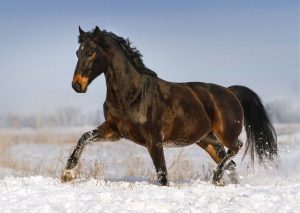If you are active in equestrian sports, you have probably already heard about the term "electrolytes. You may also know that a horse loses important salts and minerals, or electrolytes, during sweating. These substances are important for water balance in horses. It is therefore appropriate to replenish them in a timely manner so that discomfort can be avoided. In fact, a deficiency of electrolytes can cause:
- A dull coat
- Fatigue
- Tense muscles
- A reduced work ethic
- Dehydration resulting in severe kidney problems
- Performance loss
How an electrolyte supplement can be beneficial for health in horses and how to ensure proper recovery after exercise, find out in this blog!
What are electrolytes for horses?
Electrolytes are compounds that dissolve in body fluids, creating electrically charged ions. An example familiar to everyone is table salt (NaCl). Once dissolved in water, it splits into two separate ions: a positively charged sodium ion (Na+) and a negatively charged chloride ion (Cl-).
Electrolytes are critical to the health of horses. They regulate fluid balance in the body, energy balance, pH balance, muscle contraction and relaxation, and signal transmission from the brain to the nervous system. It is important to note that the body cannot make electrolytes itself, but must obtain them entirely from food and drinking water.
The most important electrolytes for horses are chloride (Cl-), sodium (Na+), potassium (K+), calcium (Ca2+) and magnesium (Mg2+). Each has its own function within the body:
| Electrolyte | Function |
| Sodium | Helps regulate the body's fluid balance, blood pressure and proper functioning of muscle and nerve cells. |
| Potassium | Essential for the contraction of muscle fibers and for proper conduction of nerve impulses. |
| Chloride | Provides fluid balance in the body, along with sodium and potassium |
| Calcium | Helps build strong bones. |
| Magnesium | Involved in the formation of bones and teeth and the transmission of nerve impulses. It also ensures normal muscle function. |
Electrolytes supplements for horses
Global Medics Electrolytes are specially formulated to help horses maintain optimal hydration and support their overall health and well-being. With our new formulas and volume options, you can easily add the supplements to your horse's water or feed so they get the essential nutrients they need to stay healthy and fit.
The optimal formula of Electrolytes ensures that the horse has enough of these essential electrolytes available to stay healthy and fit even during periods of intense work.
Electrolytes is available in powder form: https://globalmedics.be /products/ electrolytes/ and in liquid form: https://globalmedics.be /products/ electrolytes-liquid/
When is it wise to supplement electrolytes?
During hot days or after strenuous exercise, it is always recommended to administer electrolytes since horses sweat a lot in high temperatures and lose large amounts of minerals and salts.
The table below shows how much sweat and salt horses lose on average according to sweat score:
| Sweat Score | Features | Average sweat loss | Salt loss per day |
| 1 | Under the saddle is partially damp and sticky. The neck and flanks are slightly darker than normal. | 1 to 4 liters | 2 to 7 teaspoons |
| 2 | Under the saddle and on the neck it is wet. There is some foam here and there where the reins touch the neck and along the saddle. | 4 to 7 liters | 7 to 12 teaspoons |
| 3 | Under the bridle, on the neck and flanks are visibly wet with some foam spots here and there. | 7 to 9 liters | 12 to 16 teaspoons |
| 4 | Neck and flanks are completely wet. There is white foam between the hind legs. | 9 to 12 liters | 16 to 21 teaspoons |
| 5 | Same as sweat score 4, but there is also sweat dripping above the eyes and abdomen. | 12 to 18 liters | 21 to 32 teaspoons |
Tip: Want to quickly find out if your horse is fluid or electrolyte deficient? Then take a skin fold on the neck between your thumb and forefinger. When released, the skin fold should disappear immediately. Does it take a while for the fold to go away? Then it is almost certain that the water and electrolyte balance is disturbed.
General hot weather tips
In addition to supplementing electrolytes, there are several actions you can take when temperatures are high to make your horse as comfortable as possible:
- Provide plenty of fresh drinking water. A horse drinks up to 30 liters of water in normal weather, but this can increase to as much as 60 liters in hot weather.
- Avoid exercising during the warmest hours of the day. Is it really way too hot? Then allow your beloved friend a day of rest.
- Provide cooling. For example, hose down your horse with fresh water or provide a cooling blanket.
- Use sunscreen on horses with light skin around the nose to avoid sunburn.
- Keep an eye on the quality of pasture grass. The heat can cause the nutritional value in the grass to drop significantly. You can recognize this by a yellowish color and dryness. In this case, it is wise to additionally feed your horse roughage.
Do you need more information?
Not sure if your horse needs electrolytes? Or do you still have questions after reading this blog? Then feel free to contact us. Global Medics advisors are always ready to provide advice.




